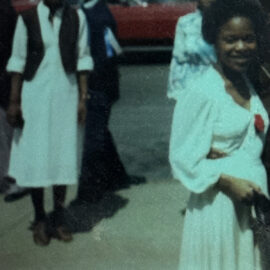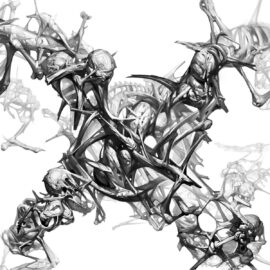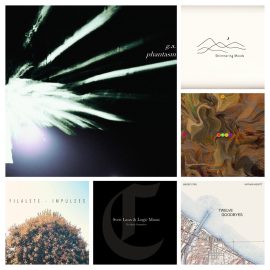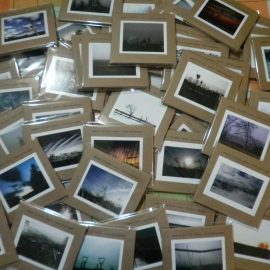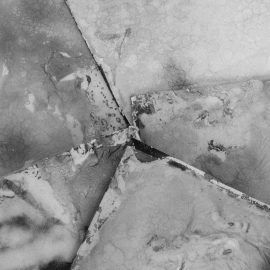
Interview with Jeremy deVine
Hey Jeremy, how are you? What did you do this past weekend?
I’m fine, thank you. This weekend I worked, as usual. I don’t spend much time doing otherwise these days, it seems, but it hardly feels like work compared to every other job I’ve ever had.
Temporary Residence Limited has been in existence since 1996, but let’s go back to the beginning. Growing up, how did you get involved in music?
I grew up listening to stuff like Simon & Garfunkel, Traveling Wilburys, Tom Petty, Bon Jovi, AC/DC and Poison. Then around age 13 I got into Nirvana and almost immediately into local Louisville punk bands. As with most teenagers, the timetable of events in my life moved much faster back then, so the leap from classic and modern rock radio to Endpoint, Slint and Seam was maybe 6-8 months. From there I just became more and more embedded in underground and experimental music.
At what point did you decide that you wanted to run your own label?
There was a Louisville label called Slamdek that worked almost exclusively with local artists. Along with Touch and Go Records they were a big beacon for getting our town’s music heard by the outside world. Discovering that record companies could be made up of only a handful of friends – or merely one person, as in Slamdek’s case – introduced an alternate reality to me
for sure.
How was the label first formed?
I had the idea to start a label while still living in Louisville, but I didn’t want to be a “local label,” and also didn’t want to compete with or be considered an alternative or competitor to Slamdek. So I waited until I moved to Baltimore to really begin. It was officially started it in late 1995 with my college roommate at the time. He and I parted ways soon after, and I ran solo from my bedroom.
Is there a particular mission statement behind the releases?
Love everything we support, support everything we love, and quit when I stop doing either.
Where does the name, Temporary Residence Limited, come from?
I moved around a lot in the year leading up to the formation of the label, so it seemed fitting. The “Limited” part refers to my original concept for the label, which was to release limited edition, handmade records, inspired by Duophonic and the Hausmusik/Payola/Kollaps labels. I ditched that notion when I realized that I preferred to have lasting relationships with artists, which would be impossible if we were constantly limiting their potential.
Talk a little about the very first label output by The (Concord Anthology) Process and Nero.
The (Concord Anthology) Process was the band I shared with my roommate at the time, Ben. We started the label together to self-release that single. The other band, Nero, were friends of mine from Louisville. The drummer was in one of my absolute favorite bands, The Telephone Man. My girlfriend at the time painted the cover art, but we printed the covers at Kinko’s, so naturally they looked pretty bad and cheap. Eventually I made new covers, each one unique and typed by myself on an old manual typewriter, crafted while watching lots of TV to keep me company. If I remember correctly, the news of Princess Dianna’s death broke while I was making those covers.
How did it feel, holding a 7″ white vinyl on which your music appeared for the very first time?
It was amazing, one of my more gleeful experiences. More surprising, perhaps, is that I still get that feeling the first time I hold virtually every record we release. That’s probably how I know I’m still on the right path in life.
The label’s first releases continued to be pressed on 7″ and 12″ limited edition vinyl. Then, the three volumes of Sounds Of The Geographically Challenged were released as a Various Compilation on a CD. Did you ever have a stance on a particular medium?
I honestly don’t have a particular preference. I do think artwork is generally more exciting on vinyl simply because it’s larger, but there are inherent difficulties with manufacturing vinyl that are unique to the medium, such as inconsistent pressing quality, frustrating fragility during transit, and a manufacturing expense that’s at least triple that of any other format.
Tell us about your Travels In Constants series. Will we ever possibly see a box set collecting all of the volumes?
Highly unlikely. It’s hard enough to complete the series, and when I finally do I can’t imagine jumping back in that fire in any capacity.
How did you meet Chris Mackie, Jim Redd and Paul Petersan? Tell us how Sonna was formed?
We all met in the Baltimore/DC area. Jim was friends with Chris, Chris was friends with Paul, I was friends with Jim. Paul was only in the band for the first 6 months or so, but he did play on our first recording. When I think of Sonna, I always consider Drew Nelson the official fourth members as he put in the years with us and played on all of our albums. I’m still in touch with all of those guys, we’re still friends. We never broke up, per se, we just wanted to do other things in our lives and felt it was the right time to pursue our separate paths.
Music by Sonna was the 17th release by your label. Tell us more about that particular release.
That was very exciting as it was the first CD I had ever played on. Only Jim had ever been on a CD prior to that, as the drummer for Coalesce, so it felt like a real milestone for us all. We recorded and mixed in 2 days, I believe, with Geoff Turner at WGNS in Washington, DC. Jim designed the cover art and he and I letterpressed and assembled the sleeves ourselves. It was such a laborious endeavor, but one that we would repeat several times throughout the history of the band.
There are so many great bands on your label. Was there a particular release at which you felt like “wow, we are really doing this”?
Tarentel “From Bone To Satellite” was the turning point for me. That was the record that made it all feel legit to me. I was still years away from having a bank account for the label or any sort of official status or even an office, but the respect and appreciation for that record spread so far, and along with Sonna, is largely responsible for influencing Explosions In The Sky and Fridge to sign with us – two artists whom I still have very close personal and working relationships with.
Did you ever have a dream of signing a particular artist or band, and did that dream come true?
There have been a few over the years. I have a strict personal policy that we will not poach artists from other labels, so if an artist is already signed to a label, they’ll have to come to us if they want to work with us. As such, I’ve avoided approaching many of my favorite artists. For
instance, I would have loved to work with Lightning Bolt, but they have such a strong relationship with Load Records, seemingly founded on the same kind of mutual respect and loyalty that we practice, so I never wanted to interfere with that. I also wanted to sign Battles, ISIS and Andrew WK. None of those panned out, though I did literally once have a dream that we signed Battles.
Who would you still love to sign?
Respecting the principles I just mentioned, I would love to work with Four Tet, Shellac, The Flaming Lips, Radiohead, LCD Soundsystem, Boards of Canada, Lungfish, The Necks, Rodrigo Y Gabriela, and Tom Petty.
You released the very first record by Tarentel. How did you meet the group?
The guys in Windsor For The Derby were sleeping at my place one night after a show in Baltimore. They had a cassette with them of some live Tarentel songs, and they accidentally left it in my tape player. It had a phone number on the back of it, so I called. It turned out to be the
girlfriend of Jefre Cantu, whom I chatted with for hours that night. I remember Jefre being so impressed that I was releasing a Rex / Songs: Ohia split 7”, which kind of baffled me. That’s probably the only reason they agreed to work with me.
What about Explosions In The Sky? How did you sign them to your label?
My friend Lee from The American Analog Set sent me a CD-R with some new AMANSET songs, plus a couple live tracks from EITS, who were his good friends and favorite local Austin band at the time. He attached a note that read, “THIS TOTALLY FUCKING DESTROYS”. It sounded like instrumental Dinosaur Jr. to me, at least in the context of that recording, which of course means I loved it and wanted to sign them straight away. I called Munaf Rayani from EITS and we talked all night, till sunrise. We would repeat that process many times over the years, and every so often still chat into the wee hours. I don’t think any of us realized back then that we would still be so close and still hold such mutual respect and admiration for each other a decade in.
And what about Matthew Cooper? He made his debut as Eluvium on your label as well!
I met Matthew when he was working at a record store in Portland, Oregon. He’s originally from Louisville, KY, but I never knew him when we were both living there. He very modestly and sheepishly gave me a couple CD-Rs of his home recordings, and I fell in love with them. We took five songs from those sessions and released it as “Lambent Material.” Matthew is amazing; a brilliant musician, a kindred spirit, and a truly thoughtful individual.
OK, I’m done with artists. No, wait, I’m not… Tell us on how you met and signed MONO!!!
Taka sent me the first MONO album, “Under the Pipal Tree,” as a demo. I wrote him back to tell him that I really liked it, but I thought it sounded too similar to Mogwai for me to really feel comfortable releasing. He and I stayed in touch and he continued to send me new recordings. They asked me for recommendations on recording engineers for their third album, “Walking Cloud…”, and I suggested Steve Albini. Taka sent me the album after they finished it and I was floored. They had progressed so much and really started to explore the darker, classical side of their sound. Take asked once again if we would sign them, and I didn’t hesitate. I’m honored to work with those guys, truly.
What is the label’s relationship with Human Highway Records?
That is Taka from MONO’s label. They release MONO and World’s End Girlfriend in Japan. For a brief period they licensed a lot of TRL releases for Japan, but those days are long gone with the ailing music industry, which is currently hitting Japan harder than most other countries.
What is the process of selecting which records get released by Temporary Residence?
If I love it at first, I’ll sit with it for a week or two, listen to it a lot to see if I become bored or disinterested. I cycle through music pretty quickly, so if I’m still really obsessing with something a few weeks later, I know it’s something special and I’ll likely pursue it.
Do you have any advice for musicians who are interested in getting a record deal?
Just play shows and make friends with bands who have good relationships with labels. The best record deal a band can get is one of mutual respect and honesty. Far too often artists trade that in for an alluring cash grab, not realizing that they’re actually betting against themselves and
their own success in exploitative record deals.
How would you say the label has evolved over the years?
As I said earlier, it started as an outlet for limited edition, handmade musical artifacts. It has grown into something closely resembling an actual record company. The biggest difference between TRL and most other labels, I suppose, is that many of the ideals and the majority of the business model have remained the same since its inception. We’re very proud to be one of the most artist-friendly labels still operating today, and with the dissolution of similar-minded icons like Touch and Go, it feels more and more like a blessing every day.
Do you have a personal favorite label release?
No. Maybe if I thought about it for a while, but I never have and I’d rather not.
Temporary Residence is grown into a stable indie label. How many people do you currently employ?
3 full-time employees including myself, plus a couple interns from time to time. I have always strived to keep the staff very small, but very smart and very devoted. I much prefer paying 2 skilled and highly enthusiastic employees a decent wage, rather than paying 5-10 employees a meager salary to do a singular monotonous task. Of course, we are distributed by a company with over 100 employees, so that is a huge reason we’re able to keep the staff modestly sized.
And who takes care of all the shipping, inventory, and managing of the distribution channels?
SC Distribution and ADA distribute our records in America. SCD is also our liaison for the dozens of exclusive distributors we work with for each individual territory throughout the world. It’s quite a large web.
Who organizes all of the artist touring? For all of the label’s artists, that sounds like a big job!
Each artist has their own booking agent, and we handle all of the tour promotion here at TRL, in conjunction with retail promotion via SC Distribution.
And what about artwork?
I do most of the layouts myself, but in most cases the artist at least has an idea of what they want, and some images for me to work with. In some cases, such as Grails, Coliseum and Young Widows, the layouts are delivered to me completed and ready to print.
How much creative control do the bands and artists have over each particular release? I’m talking about cover design, packaging, etc.
As much or as little control as they desire. Sometimes an artist doesn’t quite know what they want it to look like, or how to get it to look right. I am always happy and eager to assist in as small or large a capacity as needed. Ultimately we all want the same thing, which is for it to look and sound amazing.
The label seems to continue delivering physical releases. Although your catalog is available as a digital medium via iTunes or Amazon, will you ever open up your own digital store? Will you ever completely switch to digital-only releases?
We will never switch to digital-only releases. Digital is still very much an afterthought for many labels and bands. It’s the physical product that gets all the attention in terms of artwork, production and promotion. The artwork is the identity of the album, and to anyone who still cherishes the album format, the physical product reigns supreme. I don’t know if we’ll ever have a digital store. I’ve always liked the idea of it, but we would have to offer something different than the glut of competing services that are already in place. For instance, it would be interesting to have a digital store that sells only 320kps MP3 and lossless FLAC or WAV files, so that we could offer that outlet for people who care about preserving the integrity of the sound and have huge hard drives to store such large files.
Talk a little about the economics of running your own label in this financial environment.
I can’t speak for the history of the music industry, but I will say that the current economic climate is the most difficult we’ve ever experienced as a label. I’m not talking about the economic recession, which certainly offers its own added challenges; I’m speaking strictly of the music industry, which is in serious trouble. This is a discussion that would take far too long to write out, but I can say without a doubt that if the music industry continues its current trajectory, with the cognitive dissonance between record companies and consumers being so high, both sides are in for an avoidable but enormously damaging reality check in about 5 years. I don’t think consumers (or more specifically, former consumers who now illegally download) realize how far up the chain and how close to home the effects of their actions strike. Likewise, I don’t think major record companies and the RIAA are the smartest people in the room, and yet they’re the ones who make the big decisions regarding the future of the music industry. It’s become almost entirely reactionary on both sides, which is counter-productive and extremely damaging to the creative process. So many people on both sides have lost sight of what it is exactly that makes music so important, and that is…THE MUSIC! People think they can download the record for free and then pay to see a show and that makes it all right. The problem there is labels pay for the records to be made, but make no money from live shows or t-shirt sales. We live or die by record sales, plain and simple. If that dries up, we can’t pay for an artist to record, can’t pay to manufacture their record, and can’t promote their tours (as if they would even tour without a record to release). The only artists that could afford to release records would be independently wealthy musicians, and we all know than the richest people are not always the most creative or inspiring. Additionally, major labels are getting it all wrong by demonizing consumers. It’s a bit like how Democrats and Republicans are now only concerned with battling each other for power, having completely forgotten that government was supposed to be about the people. Except in this analogy the people are the music. Wait, what was I
saying?
What are some of the most difficult aspects of running your own label?
Staying financially solvent, and getting my email inbox down to less than 50 unanswered emails per day. Those are the two most consistently difficult challenges.
And what are the rewarding ones?
Getting to wake up every morning and go to sleep every night knowing this gets to be my job.
Any advice for someone who wants to start your own label?
The music industry has changed so much in the 15 years since we started that I honestly wouldn’t even know where to start now. These days there are more managers cropping up than labels. I think the first generation of college graduates with music business degrees is finally coming to pass, for better or for worse.
You are now into well into 185 releases, is that right? Tell us about this journey… How does it feel coming up upon your 200th catalog release?
It feels amazing, a little bit unbelievable, and a little bit frightening if we ever have to move offices again.
And only 4 years ago, in 2006, you put out the 100th release with a compilation called “Thankful”. Does it mean you’re speeding up?
That’s not entirely an accurate representation, since TRR100 was delayed and came out around the same time as TRR110. That said, we have indeed released a lot of records in the past 4 years, but many of them have been limited edition singles.
What’s next for Temporary Residence Limited?
I’ve got a plane to catch!
Thank you for your time, Jeremy… Any last words for the readers of Headphone Commute?
Thanks for caring, sincerely. I really hope we can do this for another 15 years. Or at least 10, because 25 years sounds like a nice time to go out.
Be sure to also check out Sound Bytes : Temporary Resident Limited
